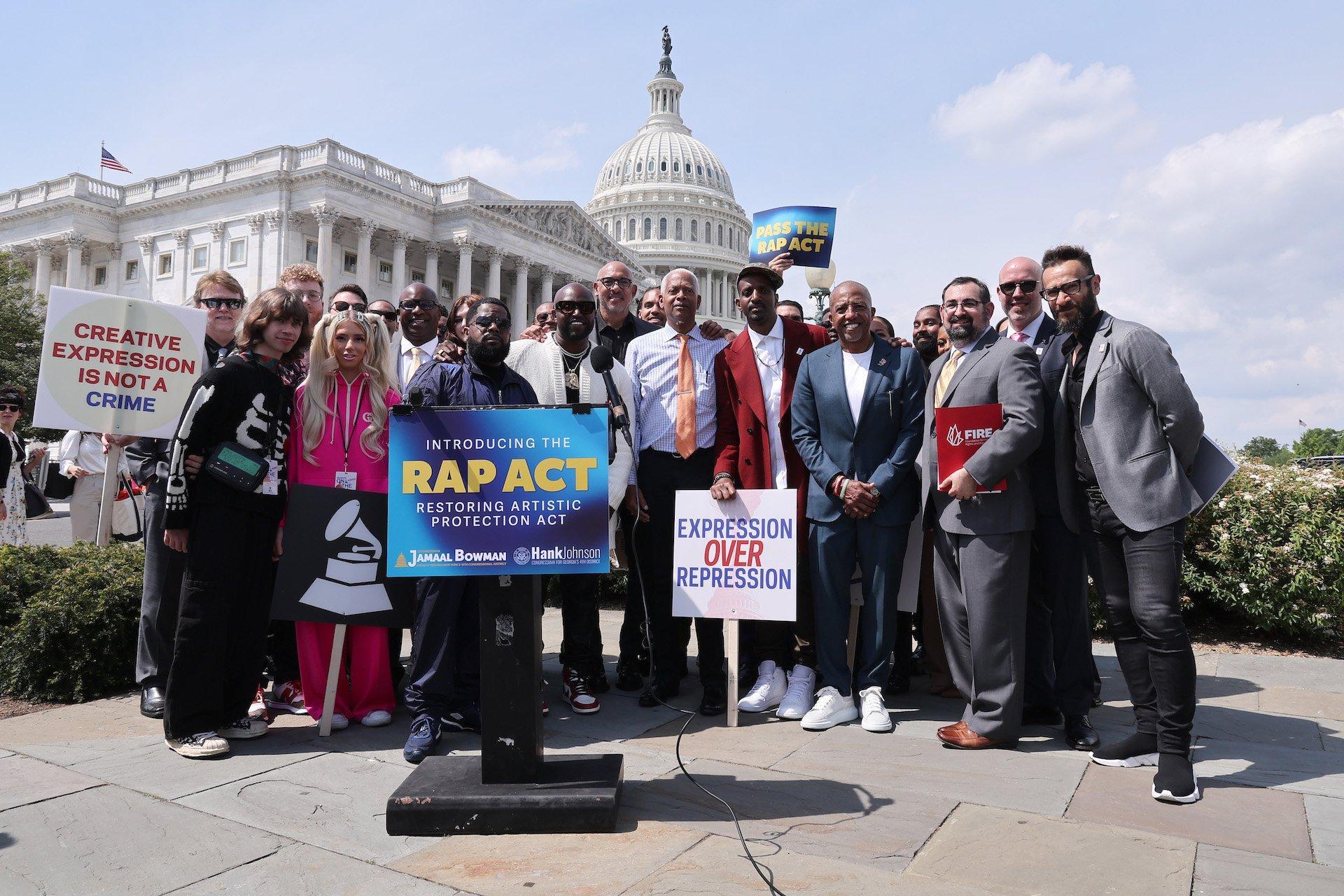The Recording Academy Takes Federal Effort to Limit Use of Song Lyrics in Court to Capitol Hill

Congressmen Jamaal Bowman (D-NY) and Hank Johnson (D-GA) from the Recording Academy® joined them at a press conference on Capitol Hill to announce the reintroduction of the Restoring Artistic Protection Act. The Restoring Artistic Protection Act would restrict the use of song lyrics in court, a prevalent practice that disproportionately harms rap and hip-hop musicians. It is intended to preserve artists’ freedom of creative expression.
Harvey Mason Jr., the CEO of the Academy, and Rico Love, the chair of the Academy Black Music Collective, among others, spoke on behalf of the industry and as artists about the significance of adopting this law and guaranteeing that all artists can freely express themselves without worrying that their work would be criminalized.
The announcement follows the Recording Academy’s Annual GRAMMYs on the Hill®, a two-day event that recognized 13-time GRAMMY® winner Pharrell Williams, Senate Majority Leader Chuck Schumer, and Senator Bill Cassidy for their steadfast support of music creators. It also brought together music creators and members of Congress from both parties to advocate for the Restoring Artistic Protection Act, the HITS Act, the American Music Fairness Act, and reform of the Recording Industry Association of America.
Advertisement
“GRAMMYs on the Hill has been bringing music creators to Capitol Hill for more than 20 years to elevate policy issues that impact our community. Today, we’re proud to see our Academy members’ commitment to advocacy come to life with the reintroduction of the Restoring Artistic Protection Act. We must safeguard artists’ freedom to create at all costs and work to eradicate the biases that come with the unconstitutional practice of using lyrics as evidence. We are grateful to Congressmen Johnson and Bowman for their unwavering commitment to music people and look forward to working alongside them to advance this issue.”
– Harvey Mason jr., CEO, Recording Academy and Rico Love, Chair, Recording Academy Black Music Collective
“This legislation is long overdue,” said Congressman Johnson. “For too long, artists – particularly young Black artists – have been unfairly targeted by prosecutors who use their lyrics as evidence of guilt, even though there is no evidence that the lyrics are anything more than creative expression. When you allow music and creativity to be silenced, you’re opening the door for other realms of free speech to be curtailed as well. The government should not be able to silence artists simply because they write, draw, sing, or rap about controversial or taboo subjects. The Restoring Artistic Protection Act (RAP Act) would protect artists’ First Amendment rights by limiting the admissibility of their lyrics as evidence in criminal and civil proceedings.”
“Rap, hip-hop and every lyrical musical piece is a beautiful form of art and expression that must be protected,” said Congressman Bowman Ed.D. “I am proud to introduce the RAP Act alongside Rep. Hank Johnson. Our judicial system disparately criminalizes Black and Brown people, including Black and Brown creativity. For example, Tommy Munsdwell Canady is a young 17-year-old kid serving a life sentence whose conviction heavily relied upon lyrics he wrote. I was deeply moved to hear that Mr. Canady continues to pursue his art in the face of our carceral systems that would otherwise stifle Black art. He is not an outlier. Evidence shows when juries believe lyrics to be rap lyrics, there’s a tendency to presume it’s a confession, whereas lyrics for other genres of music are understood to be art, not factual reporting. This act would ensure that our evidentiary standards protect the First Amendment right to freedom of expression. We cannot imprison our talented artists for expressing their experiences nor will we let their creativity be suppressed.”
Since the 2000s, there have been more than 500 cases where prosecutors have presented song lyrics as evidence in court against an artist defendant. Rap was evaluated more negatively than other music genres, according to a 2016 study by criminologists at the University of California. This finding highlights the possibility that prejudice against rap lyrics could inappropriately impact jurors when admitted as evidence to prove guilt. To correct this mistake, the Recording Academy has led the charge in limiting the use of an artist’s lyrics — among other forms of creative expression — as evidence in court cases, protecting the First Amendment rights of artists nationwide.
